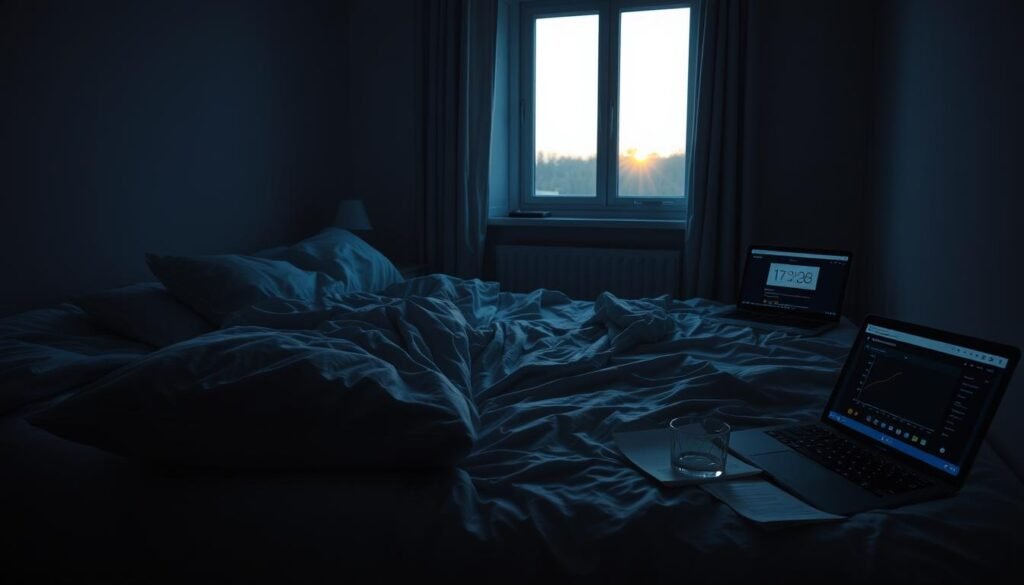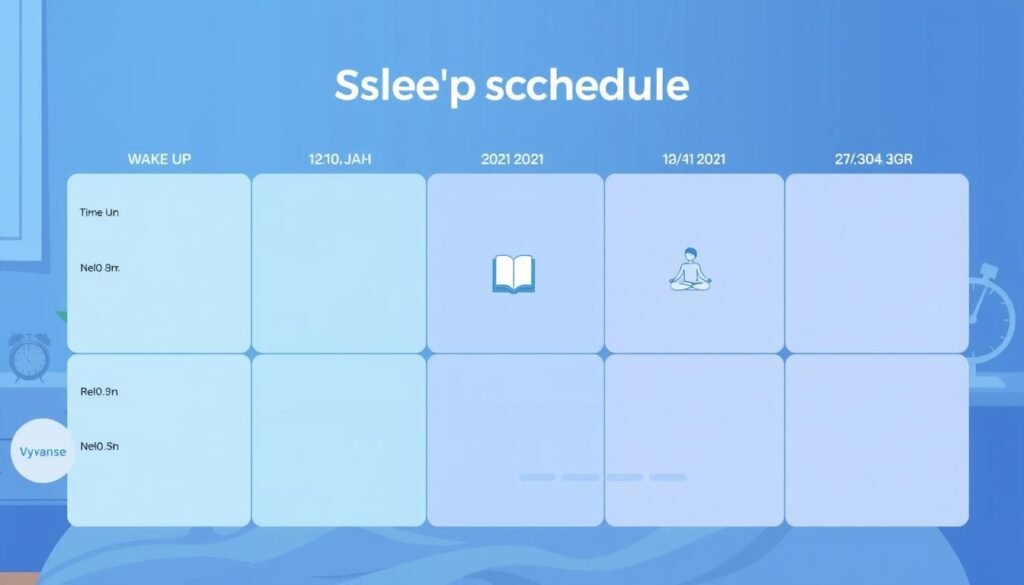Do you know why some people taking Vyvanse feel tired and find it hard to sleep after? Understanding how to handle the insomnia after Vyvanse is key for those using it for ADHD or binge eating. The side effects, like feeling irritable and fatigue, can affect your life. So, it’s important to find ways to sleep better.
Key Takeaways
- Vyvanse is a stimulant used to treat ADHD and binge eating disorder.
- Symptoms of a Vyvanse crash include irritability, fatigue, and sleep difficulties.
- Managing a Vyvanse crash effectively requires avoiding additional stimulants.
- Physical dependence on Vyvanse can lead to withdrawal symptoms upon discontinuation.
- Creating a structured sleep schedule can help mitigate insomnia related to Vyvanse use.
Understanding Vyvanse and Its Effects
Vyvanse is a well-known prescription drug. It mainly treats ADHD and binge eating disorders. Understanding its function and correct use is key for those considering it.
What is Vyvanse?
Vyvanse is a brand name for lisdexamfetamine. This stimulant is used to treat ADHD and binge eating disorders. It works by boosting concentration and focus, helping people be more productive.
How Vyvanse Works in the Brain
Vyvanse increases dopamine and norepinephrine levels in the brain. These neurotransmitters improve attention and control over impulses. Lisdexamfetamine turns into dextroamphetamine in the body. This leads to a slow release which makes the user’s experience more manageable.
Common Uses for Vyvanse
Vyvanse is frequently prescribed for ADHD. About 11% of American kids aged 4 to 17 and 8% of adults aged 18 to 44 are diagnosed with ADHD. In 2013, around 3.5 million children got stimulants like Vyvanse for ADHD. It’s also used to treat binge eating disorder, helping manage symptoms. Understanding Vyvanse helps make informed treatment choices.
| Medication | Price per 100 Tablets |
|---|---|
| Adderall | $646 |
| Adderall XR | $752 |
| Concerta | $1145-$1316 |
| Ritalin | $77-$149 |
| Generic Methylphenidate | $66-$458 |
| Vyvanse | $1035 |
Vyvanse has billions in sales and is known for its effectiveness. It’s crucial for treating ADHD and other mental health issues.
What is a Vyvanse Insomnia Crash?
A Vyvanse insomnia crash happens as the medication’s effects lessen. This leads to increased tiredness and disturbed mood and sleep. As Vyvanse’s stimulant effects fade, ADHD symptoms might return, posing challenges. It’s key to know the symptoms of a Vyvanse comedown if you’re on this medication.
Symptoms of Vyvanse Crash
The symptoms of a Vyvanse crash can cover:
- Fatigue
- Irritability
- Mood swings
- Anxiety
- Difficulty sleeping
- Resurgence of ADHD symptoms
There might also be a strong desire for the medication at this time. Recognizing these signs is crucial for handling the crash well. For deeper insights on what to expect during a crash, see this resource.
Differences Between Vyvanse Crash and Withdrawal
Though both impaired by reduced drug levels, Vyvanse crash and withdrawal differ in intensity and timing. A Vyvanse crash tends to happen during the day as its effects decrease. These symptoms are often milder than withdrawal ones. Withdrawal signs appear when stopping Vyvanse abruptly and are harsher, including:
| Vyvanse Crash Symptoms | Vyvanse Withdrawal Symptoms |
|---|---|
| Mild fatigue and irritability | Severe fatigue |
| Heightened mood swings | Increased anxiety and depression |
| Difficulties with sleep | Nausea or vomiting |
| Resurgent ADHD symptoms | Difficulty concentrating |
Knowing these differences is key for the right approach to management. Vyvanse’s classification as a Schedule II drug points to its abuse and addiction risks. This highlights the need for medical advice when dealing with these symptoms. Understanding both the Vyvanse crash and withdrawal helps users better navigate their experiences.

Managing Vyvanse Insomnia Crash
Dealing with a Vyvanse insomnia crash needs careful planning. Start by spotting what causes the crash and setting up a steady sleep routine. This helps Vyvanse users recover and stay well.
Identifying Triggers of the Crash
Finding out what leads to a Vyvanse crash is key. Things that might cause it include:
- Low blood sugar levels
- Skipped doses of the medication
- Increased stress or anxiety levels
Knowing what triggers a crash helps you make plans to avoid these causes. Eating well all day can stop blood sugar drops that make symptoms worse. Getting expert advice can offer more ways to handle amphetamine crash.
Creating a Sleep Schedule
It’s critical for Vyvanse users to have a regular sleep routine to get better. A good sleep plan means:
- Maintaining regular bedtimes and wake times
- Avoiding stimulants before bed
- Having a relaxing bedtime routine
Sticking to a sleep schedule improves your body’s sleep-wake cycle and sleep quality. Healthy sleep habits can also lessen Vyvanse-related insomnia. Making lifestyle tweaks and caring for yourself boosts sleep health. For more advice on sleep problems, you can look into ways to get better sleep.

Preventing Vyvanse-Induced Insomnia
It’s important to handle sleep difficulties when you’re taking Vyvanse. Being careful with how you take it and your lifestyle matters. These steps help you avoid sleep problems caused by Vyvanse.
Taking Vyvanse as Prescribed
Following your doctor’s instructions on Vyvanse is key. Taking it exactly as told helps keep the medicine levels steady in your body. This steady level is important. It helps avoid the medication’s crash.
This way, your sleep won’t get messed up by uneven doses. Keeping a consistent routine with Vyvanse helps avoid sleep troubles.
Avoiding Other Stimulants
It’s also important to stay away from other stimulants while on Vyvanse. Avoid things like caffeine and nicotine. These can make sleeping harder. They can also make you more irritable.
Living a balanced life without these extras is key for better sleep. Knowing how these substances mix with Vyvanse helps keep sleep issues at bay.

If you need more help with Vyvanse, check out more sources. They talk about symptoms and ways to cope. For detailed info, see this helpful article.
Coping with Stimulant Rebound Fatigue
Facing the tiredness that comes after stimulant use can be tough. Eating right and drinking enough water makes recovery easier. Knowing how to handle these factors can lead to a good plan for beating tiredness caused by stimulants.
The Importance of Nutrition
Food is key in fighting off this kind of fatigue. Eating well, with lots of vitamins and minerals, keeps your mood and energy even. Meals with complex carbs, proteins, and good fats give your body energy to beat tiredness. Foods with omega-3s, like salmon and walnuts, are great for your brain and help with sleep.
Hydration and Its Role in Recovery
Being well-hydrated is a must for recovery. Drinking enough makes you feel better and less cranky. Staying hydrated keeps your energy up and your mind clear. For those on Vyvanse, it’s even more crucial to drink plenty of water to stay sharp and handle day-to-day tasks. Drinking water helps a lot with your recovery and overall health.
To beat the tiredness from stimulant use, eating right and staying hydrated are important. For tips on better sleep and dealing with insomnia, check out more resources. This link has useful information.
Sleep Hygiene Strategies for Recovery
Setting up good sleep hygiene is key for battling insomnia, especially after stopping medications like Vyvanse. Making sure your sleeping area is calm and quiet greatly helps improve sleep. This section will show you how to make your sleeping space peaceful and share tips to relax before bed.
Creating a Restful Environment
A peaceful sleep setting is very important for sleeping well. Things like noise, light, and how warm or cool it is can change how well you sleep. Here’s what you should keep in mind:
- Reduce noise: Block out annoying sounds with white noise machines or earplugs.
- Control light: Use blackout curtains or eye masks to make your room dark.
- Comfortable temperature: Keep your room cool, ideally between 60°F and 67°F, for the best sleep.
- Choose the right bedding: Pick pillows and mattresses that are comfy and help you sleep well.
Relaxation Techniques to Encourage Sleep
Using relaxation methods can calm your mind and get your body ready for sleep. These methods can lessen stress and anxiety, which often make it hard to sleep. Here are some strategies:
- Deep breathing exercises: Slow, deep breathing can help reduce stress and relax you.
- Meditation: Try mindfulness or guided meditation to calm your thoughts before sleep.
- Gentle yoga: Do some stretching to release any tightness in your body.
- Progressive muscle relaxation: Tighten and then relax each muscle group to help your body unwind.
Using these sleep hygiene techniques can help you recover from insomnia caused by Vyvanse. By focusing on a peaceful sleep environment and using relaxation methods, you can improve your sleep quality.
Social Support and Therapy Options
Social support is key for people taking Vyvanse, especially with sleep problems. Support groups are great for sharing and learning new ways to cope. Being part of a community helps people understand they’re not alone.
Joining Support Groups
Insomnia support groups help Vyvanse users a lot. These groups are a place to talk about sleep troubles. People share what helps them sleep better, making others feel understood.
Cognitive Behavioral Therapy for Insomnia
Cognitive behavioral therapy helps with sleep issues from Vyvanse. It tackles bad habits and thoughts that stop good sleep. Changing these helps users sleep better and improve their overall health.
| Support Options | Description |
|---|---|
| Support Groups | Community spaces for sharing experiences and coping strategies among Vyvanse users. |
| Cognitive Behavioral Therapy (CBT) | A structured program to address sleep-related behavior and thought patterns. |
| Online Forums | Virtual spaces for discussion and advice on managing Vyvanse-related challenges. |
| Family Support | Encouragement and understanding from loved ones to help manage insomnia symptoms. |
Consulting Healthcare Professionals
For those feeling the side effects of Vyvanse, it’s crucial to get help. Professionals can offer ways to lessen insomnia and other side effects. Knowing when to seek advice is key to staying healthy. If you can’t sleep even after trying home remedies, see a healthcare provider. They can offer personalized advice.
When to Seek Medical Help
It’s important to know when to ask for help. If you notice:
- Persistent insomnia that affects daily life
- Feeling overly tired or other signs of a Vyvanse crash
- Mood swings or more anxiety
- Trouble focusing or managing ADHD
Doctors can check these issues and might suggest short-term meds or other help. This can improve sleep and ease Vyvanse crash effects.
Adjusting Dosages for Better Sleep
Changing how much Vyvanse you take can help your sleep. A doctor will see how the drug works for you. They make sure the amount is right, cutting down bad effects. This can make managing ADHD symptoms easier and help with better sleep.
Conclusion
Dealing with Vyvanse insomnia crash means knowing how it affects you and taking steps to recover. Putting in place a regular sleep schedule helps a lot. Also, knowing what causes your crashes can enhance your sleep.
Doing things like relaxation exercises and eating well also boost your recovery. This helps you sleep better and feel refreshed.
Always take Vyvanse as your doctor says and steer clear of other stimulants. Make sure good sleep habits are a part of your everyday life. If sleep gets hard to manage, it’s wise to talk to a doctor for help. They might change your dose to help you sleep better.
Knowing how to handle Vyvanse and its effects on sleep is key. Using these tips, you can improve your energy during the day and sleep well at night. This leads to a better life overall.